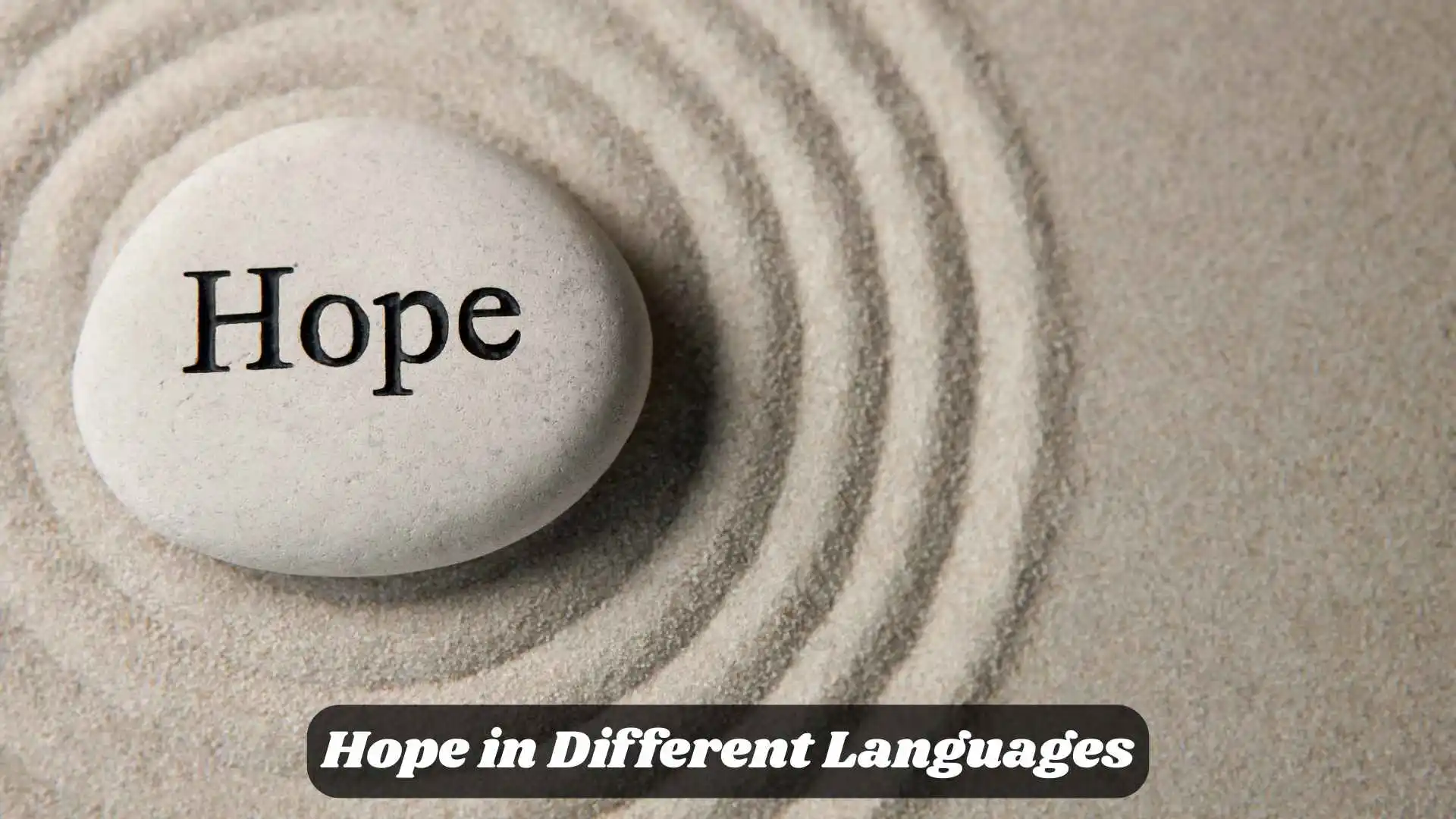Hope is a powerful feeling that transcends borders, cultures, and languages. Have you ever wondered how people around the world express this simple yet profound emotion?
In this article, we’ll explore Hope in Different Languages, uncovering how this universal sentiment is spoken, written, and shared across the globe.
This guide is crafted just for you — the curious soul who loves learning about languages and the emotions they carry.
As you read, you’ll discover not only translations but also pronunciations and examples that bring each version of “hope” to life.
By the end, you’ll feel connected to the universal human spirit that unites us all, one word at a time.
🌐 How to Say Hope in 70 Different Languages
- English (🇬🇧) – Hope | Pronunciation: hohp
Example: I have hope for a better future. - Spanish (🇪🇸) – Esperanza | Pronunciation: es-peh-RAHN-sah
Example: Tengo esperanza de que todo salga bien. (I have hope that everything will be okay.) - French (🇫🇷) – Espoir | Pronunciation: es-PWAR
Example: J’ai de l’espoir pour demain. (I have hope for tomorrow.) - German (🇩🇪) – Hoffnung | Pronunciation: HOFF-nung
Example: Ich habe Hoffnung auf bessere Zeiten. (I have hope for better times.) - Italian (🇮🇹) – Speranza | Pronunciation: speh-RAHN-zah
Example: Ho speranza per il futuro. (I have hope for the future.) - Portuguese (🇵🇹) – Esperança | Pronunciation: es-peh-RAHN-sah
Example: Tenho esperança em dias melhores. (I have hope for better days.) - Russian (🇷🇺) – Надежда (Nadezhda) | Pronunciation: nah-DYEZH-dah
Example: У меня есть надежда на светлое будущее. (I have hope for a bright future.) - Chinese (Mandarin) (🇨🇳) – 希望 (Xīwàng) | Pronunciation: shee-WAHNG
Example: 我对未来充满希望. (I am full of hope for the future.) - Japanese (🇯🇵) – 希望 (Kibō) | Pronunciation: kee-BOH
Example: 未来に希望を持っています. (I have hope for the future.) - Korean (🇰🇷) – 희망 (Huimang) | Pronunciation: hee-MAHNG
Example: 나는 미래에 희망을 가지고 있어요. (I have hope for the future.) - Arabic (🇸🇦) – أمل (Amal) | Pronunciation: ah-MAL
Example: لدي أمل في غد أفضل. (I have hope for a better tomorrow.) - Hindi (🇮🇳) – आशा (Āshā) | Pronunciation: AH-shah
Example: मुझे भविष्य के लिए आशा है। (I have hope for the future.) - Urdu (🇵🇰) – امید (Umeed) | Pronunciation: oo-MEED
Example: مجھے مستقبل کے لیے امید ہے۔ (I have hope for the future.) - Turkish (🇹🇷) – Umut | Pronunciation: oo-MOOT
Example: Daha iyi günler için umut var. (There is hope for better days.) - Greek (🇬🇷) – Ελπίδα (Elpída) | Pronunciation: el-PEE-tha
Example: Έχω ελπίδα για το μέλλον. (I have hope for the future.) - Hebrew (🇮🇱) – תקווה (Tikvah) | Pronunciation: teek-VAH
Example: יש לי תקווה לעתיד טוב יותר. (I have hope for a better future.) - Thai (🇹🇭) – ความหวัง (Khwām-wang) | Pronunciation: kwaam-WAHNG
Example: ฉันมีความหวังสำหรับอนาคต. (I have hope for the future.) - Vietnamese (🇻🇳) – Hy vọng | Pronunciation: hee-VONG
Example: Tôi có hy vọng vào ngày mai. (I have hope for tomorrow.) - Swahili (🇰🇪) – Matumaini | Pronunciation: ma-too-MAH-ee-nee
Example: Nina matumaini kwa siku zijazo. (I have hope for the future.) - Zulu (🇿🇦) – Ithemba | Pronunciation: ee-THEM-bah
Example: Nginenhlanhla yethemba. (I have hope.) - Polish (🇵🇱) – Nadzieja | Pronunciation: nah-JEH-yah
Example: Mam nadzieję na lepsze jutro. (I have hope for a better tomorrow.) - Dutch (🇳🇱) – Hoop | Pronunciation: hoop
Example: Ik heb hoop voor de toekomst. (I have hope for the future.) - Swedish (🇸🇪) – Hopp | Pronunciation: hop
Example: Jag har hopp om en bättre morgondag. (I have hope for a better tomorrow.) - Finnish (🇫🇮) – Toivo | Pronunciation: TOY-voh
Example: Minulla on toivo paremmasta tulevaisuudesta. (I have hope for a better future.) - Hungarian (🇭🇺) – Remény | Pronunciation: REH-mayn
Example: Reményem van a jobb jövőért. (I have hope for a better future.) - Czech (🇨🇿) – Naděje | Pronunciation: NAH-dyeh-yeh
Example: Mám naději na lepší zítřek. (I have hope for a better tomorrow.) - Romanian (🇷🇴) – Speranță | Pronunciation: speh-RAN-tsah
Example: Am speranță pentru viitor. (I have hope for the future.) - Ukrainian (🇺🇦) – Надія (Nadiya) | Pronunciation: nah-DEE-yah
Example: У мене є надія на краще майбутнє. (I have hope for a better future.) - Persian (🇮🇷) – امید (Omid) | Pronunciation: oh-MEED
Example: من به آینده امیدوارم. (I am hopeful for the future.) - Malay (🇲🇾) – Harapan | Pronunciation: ha-RAH-pan
Example: Saya mempunyai harapan untuk masa depan. (I have hope for the future.) - Indonesian (🇮🇩) – Harapan | Pronunciation: ha-RAH-pan
Example: Saya memiliki harapan untuk hari esok. (I have hope for tomorrow.) - Filipino (🇵🇭) – Pag-asa | Pronunciation: pag-AH-sah
Example: May pag-asa ako sa hinaharap. (I have hope for the future.) - Danish (🇩🇰) – Håb | Pronunciation: hawb
Example: Jeg har håb for fremtiden. (I have hope for the future.) - Norwegian (🇳🇴) – Håp | Pronunciation: hawp
Example: Jeg har håp for en bedre fremtid. (I have hope for a better future.) - Slovak (🇸🇰) – Nádej | Pronunciation: NAH-dey
Example: Mám nádej na lepšiu budúcnosť. (I have hope for a better future.) - Slovenian (🇸🇮) – Upanje | Pronunciation: oo-PAHN-yeh
Example: Imam upanje za prihodnost. (I have hope for the future.) - Bulgarian (🇧🇬) – Надежда (Nadezhda) | Pronunciation: nah-DYEZH-dah
Example: Имам надежда за по-добро бъдеще. (I have hope for a better future.) - Croatian (🇭🇷) – Nada | Pronunciation: NAH-dah
Example: Imam nadu za bolju budućnost. (I have hope for a better future.) - Serbian (🇷🇸) – Нада (Nada) | Pronunciation: NAH-dah
Example: Имам наду за бољу будућност. (I have hope for a better future.) - Bosnian (🇧🇦) – Nada | Pronunciation: NAH-dah
Example: Imam nadu za bolju budućnost. (I have hope for a better future.) - Estonian (🇪🇪) – Lootus | Pronunciation: LOH-tus
Example: Mul on lootus paremale tulevikule. (I have hope for a better future.) - Latvian (🇱🇻) – Cerība | Pronunciation: TSEH-ree-bah
Example: Man ir cerība uz labāku nākotni. (I have hope for a better future.) - Lithuanian (🇱🇹) – Viltis | Pronunciation: VEEL-tis
Example: Turiu vilties dėl geresnės ateities. (I have hope for a better future.) - Maltese (🇲🇹) – Tama | Pronunciation: TAH-mah
Example: Għandi tama għal futur aħjar. (I have hope for a better future.) - Icelandic (🇮🇸) – Von | Pronunciation: von
Example: Ég hef von um betri framtíð. (I have hope for a better future.) - Irish (🇮🇪) – Dóchas | Pronunciation: DOE-khus
Example: Tá dóchas agam don todhchaí. (I have hope for the future.) - Welsh (🏴) – Gobaith | Pronunciation: go-BYTH
Example: Mae gobaith gyda mi am y dyfodol. (I have hope for the future.) - Hawaiian (🇺🇸) – Mana‘o ‘Olakino | Pronunciation: ma-NAH-oh o-LAH-kee-no
Example: He mana‘o olakino kaʻu no ka wā e hiki mai ana. (I have hope for the future.) - Maori (🇳🇿) – Tūmanako | Pronunciation: too-MAH-nah-koh
Example: He tūmanako āku mō āpōpō. (I have hope for tomorrow.) - Afrikaans (🇿🇦) – Hoop | Pronunciation: hoop
Example: Ek het hoop vir die toekoms. (I have hope for the future.) - Amharic (🇪🇹) – ተስፋ (Tesfa) | Pronunciation: TES-fah
Example: እኔ ለወደፊት ተስፋ አለኝ። (I have hope for the future.) - Bengali (🇧🇩) – আশা (Asha) | Pronunciation: AH-sha
Example: আমার ভবিষ্যতের জন্য আশা আছে। (I have hope for the future.) - Tamil (🇮🇳) – நம்பிக்கை (Nambikkai) | Pronunciation: NAM-bik-kai
Example: எதிர்காலத்திற்காக எனக்கு நம்பிக்கை உள்ளது. (I have hope for the future.) - Telugu (🇮🇳) – ఆశ (Āsha) | Pronunciation: AH-sha
Example: నాకు భవిష్యత్తుకు ఆశ ఉంది. (I have hope for the future.) - Kannada (🇮🇳) – ನಿರೀಕ್ಷೆ (Nirīkṣe) | Pronunciation: ni-REEK-sheh
Example: ಭವಿಷ್ಯದ ನಿರೀಕ್ಷೆ ನನಗೆ ಇದೆ. (I have hope for the future.) - Malayalam (🇮🇳) – പ്രതീക്ഷ (Pratīksha) | Pronunciation: pra-TEE-ksha
Example: എനിക്ക് ഭാവിക്കായി പ്രതീക്ഷയുണ്ട്. (I have hope for the future.) - Gujarati (🇮🇳) – આશા (Āshā) | Pronunciation: AH-sha
Example: ભવિષ્ય માટે મને આશા છે. (I have hope for the future.) - Marathi (🇮🇳) – आशा (Āshā) | Pronunciation: AH-sha
Example: मला भविष्याकडे आशा आहे. (I have hope for the future.) - Punjabi (🇮🇳/🇵🇰) – ਉਮੀਦ (Umeed) | Pronunciation: oo-MEED
Example: ਮੇਰੇ ਕੋਲ ਭਵਿੱਖ ਲਈ ਉਮੀਦ ਹੈ। (I have hope for the future.) - Nepali (🇳🇵) – आशा (Āshā) | Pronunciation: AH-sha
Example: मलाई भविष्यको लागि आशा छ। (I have hope for the future.) - Sinhala (🇱🇰) – අපේක්ෂාව (Apekshawa) | Pronunciation: ah-PEK-shah-wah
Example: මම අනාගතය සඳහා අපේක්ෂාවක් තියෙනවා. (I have hope for the future.) - Mongolian (🇲🇳) – Итгэл (Itgel) | Pronunciation: it-GEL
Example: Би ирээдүйд итгэлтэй байна. (I have hope for the future.)
🌟 Conclusion
Hope is a powerful word that lifts spirits and inspires positivity worldwide. No matter how it’s said—“esperanza,” “amal,” or “nambikkai”—the feeling is universal. By sharing hope, we connect hearts across languages and cultures, reminding ourselves and others that brighter days are always ahead.

Oliver Grant is a passionate American author known for crafting insightful and engaging content that inspires readers worldwide. With a strong background in creative writing and a deep interest in contemporary literature, Oliver has built a reputation for delivering thought-provoking narratives that resonate with a modern audience.
Throughout his career, Oliver has consistently blended intellectual depth with relatable storytelling, making complex ideas accessible to readers from all walks of life. His writing style is both elegant and approachable, allowing him to connect meaningfully with his audience.
When he’s not writing, Oliver enjoys exploring new ideas, reading across diverse genres, and mentoring aspiring writers. His dedication to the craft and his ability to present fresh perspectives have earned him a loyal following.
Oliver Grant is the author of several acclaimed books, including “The Creative Mindset,” “Stories That Connect,” and “The Modern Writer’s Journey.” Each of these works reflects his commitment to empowering readers and fellow writers through creativity and purposeful storytelling.

